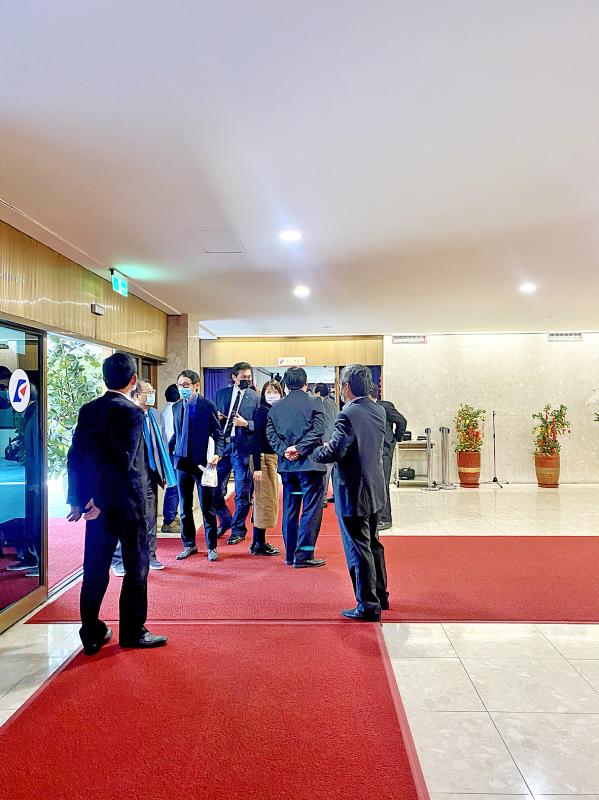Representatives from Taiwan’s top chipmakers yesterday met with government officials to discuss establishing a “semiconductor academy” that would supply the local industry with talent, the Ministry of Economic Affairs said.
The semiconductor industry would have a “big say” in how the academy is to be structured, as the private sector is paying for half of it, Minister of Economic Affairs Wang Mei-hua (王美花) said.
“It will be conducted in an experimental sandbox, where existing rules can be relaxed as talent is trained for the industry,” Wang said.

Photo: Huang Pei-chun, Taipei Times
The meeting, which was led by Vice Premier Shen Jong-chin (沈榮津), included representatives from “every leading Taiwanese semiconductor manufacturer,” as well as Minister of Education Pan Wen-chung (潘文忠), she said.
The Cabinet last year approved a draft bill regarding collaboration between the industry and academia, as well as talent development for the nation’s strategic industries.
The bill, which is under review by the Legislative Yuan, aims to alleviate a shortage of talented workers in the local semiconductor industry, as well as other key areas, the ministry said.
It calls for leading universities — National Taiwan University, National Cheng Kung University, National Tsing Hua University and National Chiao Tung University — to join the industry in launching the semiconductor academy.
Over 12 years, the government would inject up to NT$9.6 billion (US$338.86 million) into the program, while the industry would contribute at least that much, the ministry said, adding that the program is expected to train 400 new semiconductor workers.

MULTIFACETED: A task force has analyzed possible scenarios and created responses to assist domestic industries in dealing with US tariffs, the economics minister said The Executive Yuan is tomorrow to announce countermeasures to US President Donald Trump’s planned reciprocal tariffs, although the details of the plan would not be made public until Monday next week, Minister of Economic Affairs J.W. Kuo (郭智輝) said yesterday. The Cabinet established an economic and trade task force in November last year to deal with US trade and tariff related issues, Kuo told reporters outside the legislature in Taipei. The task force has been analyzing and evaluating all kinds of scenarios to identify suitable responses and determine how best to assist domestic industries in managing the effects of Trump’s tariffs, he

‘SWASTICAR’: Tesla CEO Elon Musk’s close association with Donald Trump has prompted opponents to brand him a ‘Nazi’ and resulted in a dramatic drop in sales Demonstrators descended on Tesla Inc dealerships across the US, and in Europe and Canada on Saturday to protest company chief Elon Musk, who has amassed extraordinary power as a top adviser to US President Donald Trump. Waving signs with messages such as “Musk is stealing our money” and “Reclaim our country,” the protests largely took place peacefully following fiery episodes of vandalism on Tesla vehicles, dealerships and other facilities in recent weeks that US officials have denounced as terrorism. Hundreds rallied on Saturday outside the Tesla dealership in Manhattan. Some blasted Musk, the world’s richest man, while others demanded the shuttering of his

TIGHT-LIPPED: UMC said it had no merger plans at the moment, after Nikkei Asia reported that the firm and GlobalFoundries were considering restarting merger talks United Microelectronics Corp (UMC, 聯電), the world’s No. 4 contract chipmaker, yesterday launched a new US$5 billion 12-inch chip factory in Singapore as part of its latest effort to diversify its manufacturing footprint amid growing geopolitical risks. The new factory, adjacent to UMC’s existing Singapore fab in the Pasir Res Wafer Fab Park, is scheduled to enter volume production next year, utilizing mature 22-nanometer and 28-nanometer process technologies, UMC said in a statement. The company plans to invest US$5 billion during the first phase of the new fab, which would have an installed capacity of 30,000 12-inch wafers per month, it said. The

Taiwan’s official purchasing managers’ index (PMI) last month rose 0.2 percentage points to 54.2, in a second consecutive month of expansion, thanks to front-loading demand intended to avoid potential US tariff hikes, the Chung-Hua Institution for Economic Research (CIER, 中華經濟研究院) said yesterday. While short-term demand appeared robust, uncertainties rose due to US President Donald Trump’s unpredictable trade policy, CIER president Lien Hsien-ming (連賢明) told a news conference in Taipei. Taiwan’s economy this year would be characterized by high-level fluctuations and the volatility would be wilder than most expect, Lien said Demand for electronics, particularly semiconductors, continues to benefit from US technology giants’ effort